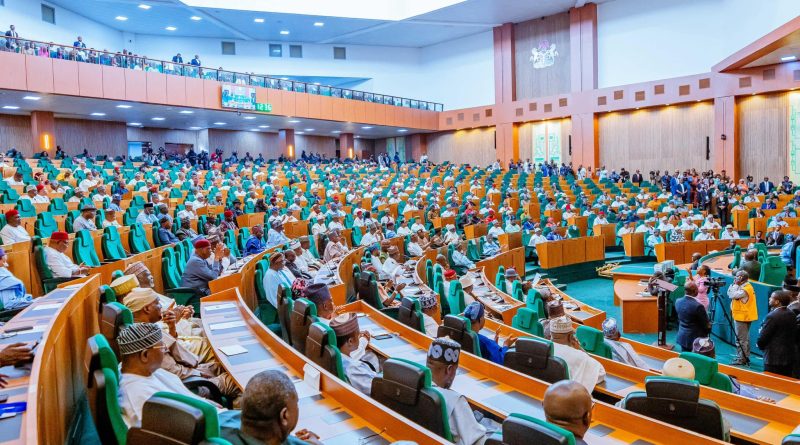Reps move to place VAT on exclusive list in constitution, pass bill for second reading
A bill seeking to include Value Added Tax (VAT) in Nigeria’s exclusive legislative list has scaled second reading in the House of Representatives.
The proposed legislation, co-sponsored by Deputy Speaker Benjamin Kalu, and six other lawmakers, aims to bring uniformity and constitutional clarity to tax administration iin Nigeria.
The co-sponsors are Chris Nkwonta, Daniel Ago, Nkemkanma Kama, Tolani Shagaya, Alex Egbona, and Joshua Gana (PDP, Niger).
If passed, it could reshape the country’s fiscal federalism and redefine how revenues are collected and shared across the three tiers of government
Leading the debate on the bill during Wednesday’s plenary, Mr Gana said the current structure of Nigeria’s fiscal system has become too confusing, inefficient, and prone to conflicts.
According to him, the proposed amendment seeks to streamline tax responsibilities and end years of overlapping mandates between the federal, state, and local governments.
“This bill seeks to bring order where confusion reigns, to create clarity where overlaps have persisted, and to ensure that every naira raised, shared, or spent by the government is traceable, lawful, and transparent,” Mr Gana stated.
He explained that the bill’s ultimate objective is to align the revenue powers of the different levels of government in a way that promotes efficiency, discourages duplication, and restores citizens’ trust in Nigeria’s fiscal framework.
“The fiscal architecture of our federation has, over time, become congested and conflicting. Multiple taxes and levies are imposed at different tiers of government, often on the same taxpayer. Revenue agencies overlap, leading to inefficiencies and litigation over collection rights, as seen in disputes over Value Added Tax (VAT), stamp duties, and personal income tax,” Mr Gana said.
The lawmaker noted that the constant disputes among revenue-generating agencies and tiers of government have created uncertainty for investors and weakened Nigeria’s economic planning.
He decried the increasing trend of outsourcing tax collection to private consultants, describing it as a source of corruption, harassment, and massive revenue leakages.
Key provisions of the bill
Mr Gana emphasised that the bill’s four key clauses were carefully designed to tackle these systemic issues.
First, it proposes a constitutional clarification stating that stamp duties collected by the federal government will apply only to documents or transactions involving corporate entities, while those arising from individual transactions will remain within the purview of state governments. This provision, he said, will prevent future conflicts over jurisdictional authority.
Second, the bill seeks to introduce VAT (or consumption tax) into the exclusive legislative list, which would give the National Assembly and by extension, the federal government clear constitutional authority to legislate and collect VAT nationwide.
This is aimed at creating a uniform, predictable, and transparent VAT regime across the country, instead of the current fragmented system where states and the federal government are locked in legal battles.
Third, it seeks to prohibit the outsourcing of tax collection to private consultants or agents, a common practice by many government agencies and local councils that has often resulted in intimidation of small businesses, inflated collections, and unremitted funds.
Fourth, the bill proposes a maximum limit of nine taxes, levies, or charges that can be imposed on an individual or business in a given year, in order to reduce the burden of multiple taxation.
It also moves to streamline the tax collection powers of local governments by eliminating redundant or overlapping levies that frequently lead to harassment of market traders, artisans, and small business owners.
Mr Gana argued that once the bill becomes law, it will significantly reduce conflicts among the three tiers of government, enhance coordination among revenue agencies, and promote transparency in how public funds are collected and distributed.
If eventually passed and signed into law, the new bill will not only settle the constitutional question surrounding VAT but also help Nigeria move toward a more harmonised, transparent, and efficient tax system that supports growth and accountability.
The bill scaled second reading without debate and the Deputy Speaker Benjamin Kalu who presided over the plenary referred it to the Committee on Constitution Review which he heads.
The committee will carry out further legislative action and public input before it proceeds to third reading.
Ongoing VAT dispute
The move by the House comes against the backdrop of a lingering legal and political dispute between the Federal Inland Revenue Service (FIRS) and some states, notably Rivers and Lagos, over who has the constitutional right to collect VAT.
In 2021, the Rivers State Government secured a Federal High Court judgment granting states the right to collect VAT within their jurisdictions. The court ruled that the federal government lacked constitutional authority to do so, a decision that was widely celebrated by many states pushing for fiscal autonomy.
READ ALSO: Nigerian lawmakers launch probe into $850bn unremitted oil, non-oil export proceeds
However, the FIRS immediately appealed the ruling, and the Court of Appeal later ordered all parties to maintain the status quo pending the final decision of the Supreme Court, where the matter remains unresolved.
The case ignited a broader national debate about the structure of Nigeria’s fiscal federalism and whether states should have greater control over revenue generation and spending within their territories.
Additionally, according to FIRS, Nigeria’s VAT has reached N6.72 trillion as of 2024, up from about N3.64 trillion the previous year, an increase of roughly 84.6 per cent making it one of the most significant sources of non-oil income for Nigeria.

